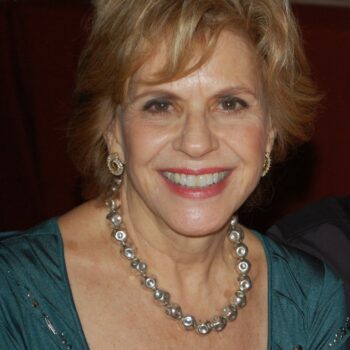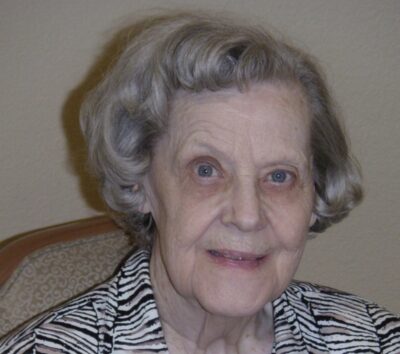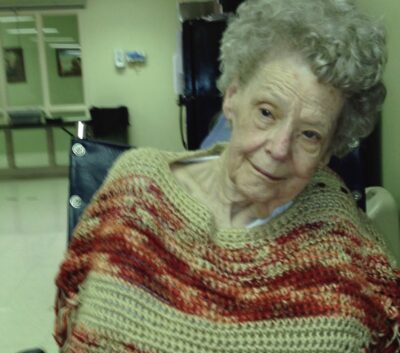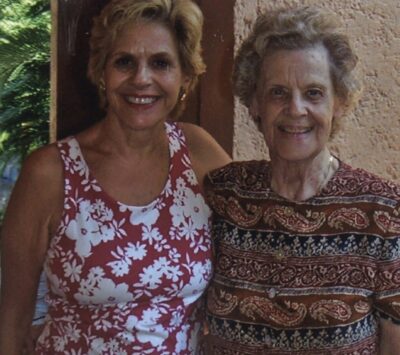Constance L. Vincent

When I went to visit her for her 93rd birthday in March 2013, she didn’t recognize me at first. She opened the present I brought her, and after the aide and I sang “Happy Birthday” to her, Mother just looked at us. “I’m never happy now,” she said. That was almost the last full sentence she ever said to me. My mother’s death meant her final release from a decade of suffering.
May 11th, 2018
Constance L. Vincent was a caregiver for her parents who had dementia. She is the author of two books: Not Going Gently: A Psychologist Fights Back against Alzheimer’s for Her Mother. . .and Perhaps Herself and Karma in Action: Finding Meaning, Making Choices. She earned a Ph.D. at UC Irvine and taught developmental psychology at Chapman and Santa Clara universities. She and her husband Ed live in Menlo Park, CA, where she is on the committee for seniors in a care center.
When my mother first began to show signs of memory loss, I thought she only needed to try harder to concentrate, to focus and pay attention to conversations so she could remember what was being said. Then, as my father showed increasing cognitive decline in his last years, I assumed it was a delayed effect of the lack of oxygen to his brain during the two open-heart surgeries he’d undergone. In both cases, I was in denial and could not bring myself to recognize even the possibility of Alzheimer’s disease in either of the parents I loved.
As a developmental psychologist, I have learned a lot about a healthy, successful passage through all the stages of life—in other words, a normal development. The classes I taught at the university level reflected my own age and philosophy. When I came up against Alzheimer’s, it had no place in my view on aging.
Whether or not the dementia my father suffered in his last few years was late-onset Alzheimer’s disease, vascular dementia or a combination of mixed dementias, I’ll never know for sure. Dad’s mental abilities declined quite rapidly, more so after he broke his hip in a fall and had to live in a rehabilitation center the last four months of his life. His rapid failing since my last visit for his birthday in mid-December would indicate that he perhaps had suffered a stroke when he died on January 2, 2005, at the age of 87.
When my father passed away, my mother was already showing signs of mild cognitive impairment (M.C.I.), a stage between normal aging changes and mild dementia. At her age, 85, her short-term memory was noticeably affected, but she was still able to perform the basic activities of daily living independently. I was determined to keep my mother from ever joining the group whose M.C.I. advanced to Alzheimer’s disease.
I began to study and read as much as I could about dementia and Alzheimer’s disease to learn the best diet, the best supplements and the best activities that would help save my mother. I was ready to fight back. And if I couldn’t completely protect her from eventual Alzheimer’s, I at least wanted her to be active and healthy, enjoying her present life, for as long as possible.
My task was complicated, however, by two rather serious obstacles.
First, since I live near San Francisco and my mother was then living near Las Vegas, we were separated by either a nine-hour drive or a flight. Second, I had no legal control over where she’d live or her care, as my only brother, a medical doctor, had the power of attorney to administer her affairs. Other than trips to visit her, or the times I arranged for her to come and stay with me, I had to rely on telephone calls to stay in touch.

After her M.C.I. diagnosis, I began calling her a few nights per week before she went to bed, mainly to keep her mind stimulated with conversation and her spirits up by wishing her a good night with a hug and kiss over the phone. But as time went on and she was moved from living with my brother in his home to being placed into three different care facilities, her side of the conversation became more emotional, full of fears and her hopes of escape.
Mom’s memory loss was becoming worse, much more significant than forgetting words or names. I realized that certain factors were greatly increasing her risk for Alzheimer’s as opposed to a more mild cognitive impairment. The multiple moves, the separation from her family and lack of social interaction, and the daily reminder that she was in a memory care unit resulted in depression and anxiety.
I started to record what she said on my evening phone calls to her because her statements were profoundly sad and reflected her struggle to understand her new environments. Her words and her predicament touched me deeply, and I was frustrated at being legally powerless to intervene. Those evening talks, sending each other hugs and kisses over the phone, were my way of tucking Mother into bed and wishing her sweet dreams. It was mainly through these evening phone calls that my mother expressed herself the most.
At first when I asked her how her day had been, she’d tell me, “Oh, I was so busy all day.” Or, “I went out and did some shopping,” or something else she made up. I tried to understand her responses. Was she engaging in fantasy to fill her days? Was she inventing a story to make me feel good and hide her unhappiness? Or was her lack of stimulation causing her to imagine an alternate reality?
More often in our conversations, she’d reveal her true feelings about her surroundings. Although I finally acknowledged the necessity of the memory-care unit for my mother as her needs for help increased, she was never able to accept being there. Over a period of time I kept a record of many of her spontaneous statements because they were so painfully poignant and so full of emotional significance.
About a year after she entered memory care, I was on the phone with Mom on a night when she was more talkative and ruminative than usual. She spoke about escape, confusion over who she was and fear, but she also mentioned hope.
“I’m still here,” she said, “and I think I’m just going to go back to my old life. I don’t want to be at this place.”
She mentioned how she felt trapped, but also talked with hope about the future, a time when she would be able to escape her situation.
“I’ll feel better once I get going on my own pattern. Right now I’m just stuck. Once I get myself free, I’ll feel much better. I’ll redeem myself again. I’ll feel more alive again,” she said.
Mother talked about living her own reality, even as she was confused by her surroundings and her mind started to fail her.
“So I made up my mind it’s not the way I want to live. It’s not me. You begin to feel like you’re nobody. You can’t live your life like this, so I just made up my mind to be in my own place,” she told me.
And even in her state of confusion, she tried to reassure me.
“Don’t worry about me,” she said. “This is something I have to figure out for myself. Wherever I am, I’ll get it all straightened out.”
During that entire year, in various phone conversations, Mom often repeated the major themes of escape, identity and hope.
“I hope to get home soon. Sometimes I get tangled up in the atmosphere,” she told me one night.
But by the end of Mom’s second complete year in the memory care unit, the effects of her isolation and lack of stimulation were expressed more in fear and confusion than in hope of escape.
“I’m wondering where I’m supposed to be. I don’t know these people. They’re all strange to me. Heck of a way of living. I don’t even know what this place is called,” she told me.

Two months later, she said, “I feel left out of things. I’m left out of everything I had. I’m not a necessary person now at all; I feel very unnecessary.”
I wish I could give this a happy ending, but as I learned, Alzheimer’s does not work that way. Things became even worse for my mother. In May of 2011 when I visited her, I noticed that she was not seeing well. I requested an eye exam for her, something she should have been having regularly. When she finally did receive the exam, it revealed cataracts in both eyes. Some of my siblings thought she should not go through with the surgery due to her age—91—but I pressed for it because I could see that my mother was virtually blind. Six months later, when the eye doctor removed the cataracts, he discovered that she was blind in one eye due to untreated glaucoma over time. In my research, I saw that so many elderly people are not receiving routine eye care, which contributes to their decline and confusion.
During the following two years, I more frequently heard my mother lament, “Everything is confusing to me. Nothing works like it’s supposed to.” My evening phone visits with Mother became less frequent and finally stopped. She never had initiated the calls; now she didn’t even pick up the receiver. She tired easily and was finding conversations more difficult.
When I went to visit her for her 93rd birthday in March 2013, she didn’t recognize me at first. She opened the present I brought her, and after the aide and I sang “Happy Birthday” to her, Mother just looked at us. “I’m never happy now,” she said. That was almost the last full sentence she ever said to me.
Two months later, she fell and broke her right hip. After her surgery, the memory care unit where she had lived for five years would not take her back. She was transferred to a skilled nursing unit in a hospital where she lived the last three years of her life either in bed or in a wheelchair. She passed away in June 2016.
My mother’s death meant her final release from a decade of suffering. Watching the changes in her had been like watching a slow-motion tragedy that I was not able to stop. The only thing I could do was to document my mother’s experience as a tribute to her and a way to help others.
I think that my mother’s words show the feelings and needs that some Alzheimer’s patients have: the need for family interactions, memory stimulation, and familiar activities, as well as the need to retain their identity and some belongings. A few senior centers are now addressing these needs. The Hogeway Care Center outside of Amsterdam was the first dementia village to replicate a normal indoor/outdoor environment. Other facilities in the U.S. plan to follow this model. Reminiscence Therapy, or asking patients to discuss past experiences with others, music therapy and other ways of stimulating memories are also becoming more common.
As more people develop Alzheimer’s, families must plan together for eventual living and financial needs, and society must protect the most vulnerable, especially by becoming more invested in medical research and by building better, more caring facilities that focus on patients’ needs.

This excerpt originally appeared in Constance L. Vincent’s book, Not Going Gently: A Psychologist Fights Back against Alzheimer’s for Her Mother. . .and Perhaps Herself, and was adapted for Being Patient. The book is now available in Spanish as well. Read more stories like Constance’s here. For access to weekly talks with experts on Alzheimer’s and brain health, join our new Facebook group, Being Patient: Brain Talks.